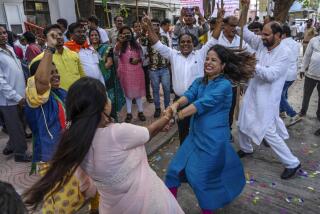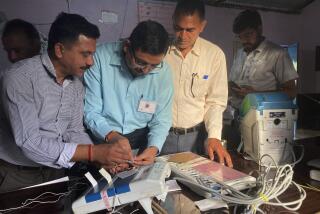Kenyans Vote Amid Relative Calm; Opposition Candidate Leads
- Share via
NAIROBI, Kenya — The door began to close Friday on the 24-year reign of one of Africa’s last “big man” dictators, President Daniel Arap Moi, as millions of Kenyans went to the polls in relatively peaceful elections.
Very preliminary results showed that opposition candidate Mwai Kibaki, 71, a political insider who served under both of Kenya’s prior presidents, was outpacing his main rival, Uhuru Kenyatta, 42, who had been handpicked by Moi.
Kenyatta’s defeat would be a stunning blow to Moi’s Kenya African National Union party, or KANU, which has held power for the four decades since independence from Britain. Moi is constitutionally barred from running again.
Kenyan election officials say that the definitive count will take several days.
Parliamentary elections are expected to be closer than the presidential race, experts say. KANU is likely to lose seats in what has been seen as a rubber-stamp body for Moi.
There were scattered reports of violence. In Nairobi, the capital, opposition supporters beat a man unconscious and stripped a woman on suspicion that they were bribing voters to support Kenyatta. And some Kibaki backers accused election officials of strategically omitting their names from some voter rolls.
But in most parts of the country, the elections were orderly and fair, according to Graham Elson, deputy chief of the European Union’s election observer delegation.
“So far, so good,” said Elson, one of 240 international monitors in Kenya for Friday’s vote. “Obviously, today has been a lot more peaceful than people were forecasting.”
For many Kenyans, Friday represented a chance to rid the nation of a corrupt government that has led the country into economic despair. In 1997, the World Bank and the International Monetary Fund suspended aid to Kenya, citing corruption as a main reason. Despite the East African nation’s robust tourism trade and abundant natural resources, more than half of Kenya’s 30 million people live on less than $1 a day.
“We have been pushed so much, and we know that all that KANU can do is eat and be rich,” said Jackson Wekesa, a 29-year-old industrial worker who voted for Kibaki’s pledge of jobs, housing and improved primary education. “We will now give the opposition five years to see what they can do to bring us a good life.”
Kibaki had been heavily favored to win, leading Kenyatta by as many as 47 percentage points, according to a recent survey by the Washington-based International Republican Institute.
In his speeches, Kibaki promised a new future for Kenya and said he would tackle government corruption, provide free education and move the nation’s stagnant economy forward.
Kibaki has tried to distance himself from Kenya’s elite, but he is among the most veteran of the five major presidential candidates, having been vice president from 1978 to ’88 and finance minister from 1969 to ’82.
Kenyatta is the son of Jomo Kenyatta, who became Kenya’s first president after leading the country’s independence movement. His campaign has benefited from his family’s vast wealth and influential friends -- including Moi.
At one recent campaign rally, Kenyatta told the crowd, “They say Moi will rule using me as his instrument -- but I tell you Moi is going home after tomorrow. I will be my own man. I will not be his man.”
Although Kenyatta touts his newcomer status -- he has never held elected office -- his opponents attack him for being the strongman’s surrogate. Moi has acknowledged that he believes Kenyatta “is a person who can be guided.”
As Wanjiru Muthoni, a vegetable seller and father of seven children, stood in line outside a polling station in the Nairobi-area town of Makadara, he said he was tired of being lied to by his government.
“I expect the change [the government] promised me,” said the 55-year-old opposition supporter. “We were promised education, water, electricity, but until now nothing has changed. I wish to see my grandchildren get the good things they were promised.”
In the weeks leading up to Friday’s election, many Kenyans worried that they would see a repetition of earlier voter fraud and violence.
Mary Wamjiku was so suspicious of the ruling party that she decided to keep watch at her voting location -- a school in a village 70 miles west of Nairobi -- until the polls closed after dark.
“I and other voters must be vigilant until the last ballot is counted,” said Wamjiku, an unemployed mother of five children. “In 1997, we were told that ballot counting could not go on because there was no fuel in the pressure lamps.... As you can see, this time we have brought our own lamps.”
Many opposition supporters predicted mass protests if Kenyatta won the election.
John Stremlau, an international relations professor at the University of Witwatersrand in South Africa, said that a Kenyatta victory “would be a catastrophe” and a recipe for civic unrest.
*
Moore reported from Johannesburg, South Africa, and Okello from Nairobi. Special correspondent Nicholas Soi in Nairobi contributed to this report.
More to Read
Sign up for Essential California
The most important California stories and recommendations in your inbox every morning.
You may occasionally receive promotional content from the Los Angeles Times.













